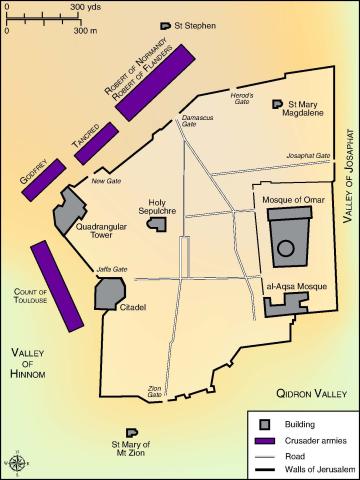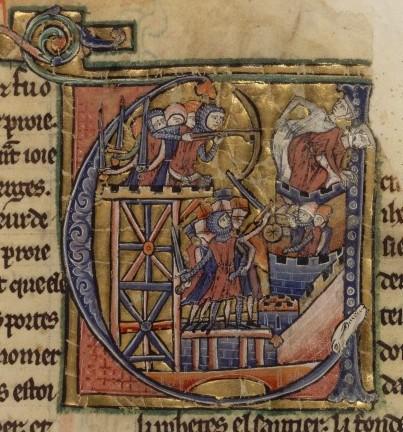The Capture of Jerusalem
[10.38.1] Tunc seniōrēs nostrī ōrdināvērunt quōmodo ingeniāre possent cīvitātem, ut, ad adōrandum nostrī Salvātōris, intrārent Sepulchrum. Fēcēruntque duo lignea castra, et alia plūra māchināmenta. Dux Godefridus suum fēcit castrum cum māchinīs, et Raimundus comes similiter; quibus dē longinquīs terrīs attrahēbant ligna. Saracēnī igitur videntēs nostrōs facientēs hās māchinās, mīrābiliter mūniēbant cīvitātem, et turrēs nocte accrēscēbant. Videntēs autem nostrī seniōrēs ex quā parte esset cīvitās magis languida, illūc in quādam nocte Sabbatī dēportāvērunt nostram māchinam et ligneum castrum in orientālem partem. Summō autem dīlūculō ērēxērunt ea, et aptāvērunt et ōrnāvērunt castrum, in prīmā et secundā ac tertiā fēriā. Comes namque Sānctī Egidīī, ā merīdiānā plāgā reficiēbat suam māchinam. Intereā in tantā pressūrā sītis fuimus districtī, ut ūnus homō nōn posset prō ūnō dēnāriō ad sufficientiam habēre aquam aut exstinguere sitim suam.
notes
(July 1099) The crusaders now construct siege engines, though the timber must be brought from a long way off. In response, the Saracens improve their fortifications. The crusaders bring siege equipment to the eastern side of the city, while Raymond of Toulouse does the same on the southern side.
ōrdināvērunt quōmodo ingeniāre possent cīvitātem: “decided how they could contrive (to take) the city.”
ad adōrandum nostrī Salvātōris: “to worship our Savior” or perhaps “to worship (at the tomb) of our Savior”
adorō: adorō (1) in CL would take an accusative.
duo lignea castra: “tow wooden forts,” i.e., two siege towers.
et alia plūra māchināmenta: other siege equipment.
cum māchinīs: “along with (other) machines.”
quibus: "for (the construction of) which (machines)."
in quādam nocte Sabbatī: the night of Saturday, July 9, 1099.
nostram māchinam: presumably our author is referring to his own participation.
in orientālem partem: see 10.37.4.
ērēxērunt ea: = ērēxērunt māchināmenta.
in prīmā et secundā ac tertiā fēriā: Sunday, Monday, and Tuesday, July 10–12.
vocabulary
ordinō (1): to arrange
ingeniō (1): to devise, contrive (ML)
ligneus –a –um: wooden
māchināmentum –ī, n.: a machine, engine
accrescō accrēscere accrēvī accrētum: to grow progressively, increase
languidus –a –um: faint, weak
aptō (1): to adapt, fit, apply, adjust
ōrnō (1): to fit out, furnish, supply, prepare
merīdiānus –a –um: of noon; southern
plaga –ae, f.: a region, quarter, tract
dēnārius –iī, m.: denarius; (ML) penny


